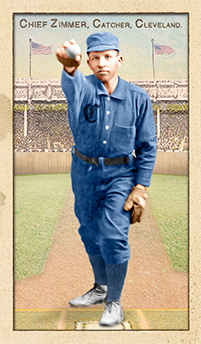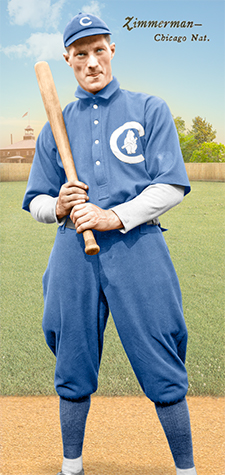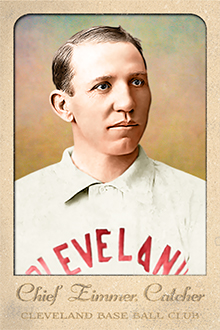
- Series: Beginnings: 1880's
- City: Cleveland
- Team: Blues (AA)
- League: American Association
Charles Louis Zimmer (1860-1949) was one of the great catchers the game has known. As Cy Young’s receiver from 1890-98, Chief was extolled by the great pitcher as a peerless partner. The two grew up together with Cleveland with Zimmer setting numerous records at his position while guiding the nascent talent that would come to define baseball greatness. Perhaps fittingly, when Young left Cleveland after the ‘98 season, the club let the 38-year-old Zimmer go, too. He was spared the indignity of laboring for next year’s “worst team in history” club that went 20-134. Chief went on to a pennant with Pittsburgh in 1901, catching HOF’er Jack Chesbro. In ‘03 Pirate owner Barney Dreyfuss persuaded Zimmer to move to Philadelphia to manage the Phillies before retiring at 42.
- Zimmer claimed no Native American heritage. The “Chief” was due to being the team leader on an early club so speedy as to be dubbed “Indians”
- The Sporting Life wrote in 1890 that Zimmer was one of about 6 major leaguers who abstained from both liquor and tobacco. Despite his aversion to smoking, Zimmer made a fortune selling cigars, spreading his business to every city his ball club visited
- Was elected 1st president of The Players’ Protective Association – predecessor to the MLB Players’ Association
- An entrepreneur and wise investor, Zimmer was known to be one of the wealthiest players of his day
- Zimmer famously invented Zimmer’s Base Ball Game, a mechanical parlor game popular in the 1890s
- Zimmer's uniform color on this card was changed in June, 2017 from black to blue to reflect recent reliable research by Craig Brown & friends at Threads of Our Game. Six cards were previously released featuring a black uniform.

- Series: Pilgrims
- City: Chicago
- Team: Cubs
- League: National League
Henry Zimmerman (1887-1969) found it tough to break into the Tinker/Evers/Chance infield in Chicago, but once Johnny Evers went out with an injury in 1910, Zimmerman’s bat proved too valuable to deny. Another loss at third in 1912 opened further opportunities for the talented New Yorker. Recent research supports the restoration of Heinie’s career-year Triple Crown, long withheld due to the era’s dodgy stats for RBI, coupled with an even dodgier reputation for a player eventually banned from the game on testimony of John McGraw. Always a lightning rod, The Great Zimbasked in celebrity and lived large. Parlaying the “strongest pair of hands and arms…ever seen on a human being” he swung with blithe disregard for the strike zone. Leaving the Cubs for his hometown Giants in 1916 proved fateful. Branded the goat of the ‘17 Series, Zim never overcame suspicions of shady dealings, resulting in a 1921 banishment by Judge Landis.
- Career .295 average, with 58 HRs and 796 RBI
- Played for the last Cub championship in 1908 and three other pennant-winners
- For decades Honus Wagner’s 102 RBI had been deemed to exceed Heinie’s 99 until SABR’s exhaustive study validated 104
Auction History
Cartophilia
T201 Mecca Canvas: Nap Rucker

- Series: Pioneer Portraits II: 1875-1899
- City: Cleveland
- Team: Spiders
- League: National League
Charles Louis Zimmer (1860-1949) was one of the great catchers the game has known. As Cy Young’s receiver from 1890-98, Chief was extolled by the great pitcher as a peerless partner. The two grew up together with Cleveland with Zimmer setting numerous records at his position while guiding the nascent talent that would come to define baseball greatness. Perhaps fittingly, when Young left Cleveland after the ‘98 season, the club let the 38-year-old Zimmer go, too. He was spared the indignity of laboring for next year’s “worst team in history” club that went 20-134. Chief went on to a pennant with Pittsburgh in 1901, catching HOF’er Jack Chesbro. In ‘03 Pirate owner Barney Dreyfuss persuaded Zimmer to move to Philadelphia to manage the Phillies before retiring at 42.
- Zimmer claimed no Native American heritage. The “Chief” was due to being the team leader on an early club so speedy as to be dubbed “Indians”
- The Sporting Life wrote in 1890 that Zimmer was one of about 6 major leaguers who abstained from both liquor and tobacco. Despite his aversion to smoking, Zimmer made a fortune selling cigars, spreading his business to every city his ball club visited
- Was elected 1st president of The Players’ Protective Association – predecessor to the MLB Players’ Association
- An entrepreneur and wise investor, Zimmer was known to be one of the wealthiest players of his day
- Zimmer famously invented Zimmer’s Base Ball Game, a mechanical parlor game popular in the 1890s


